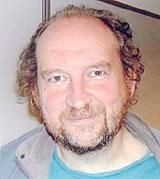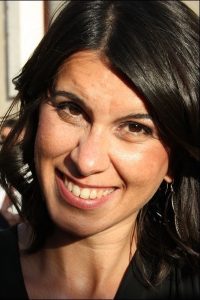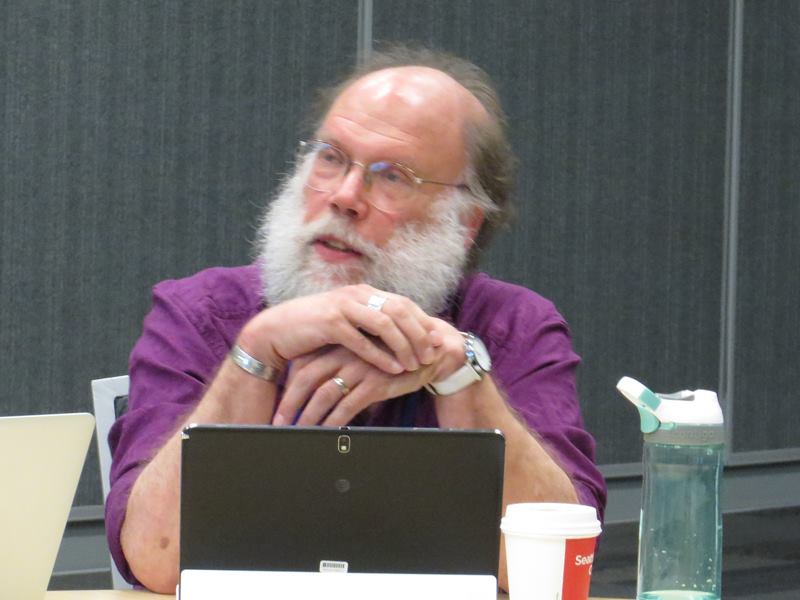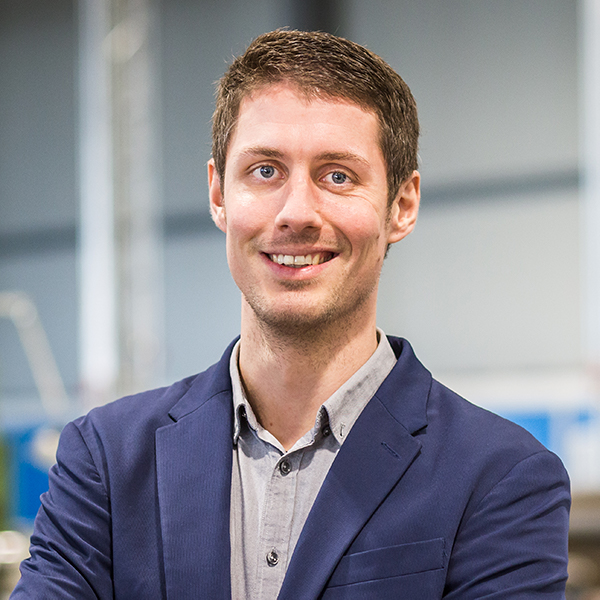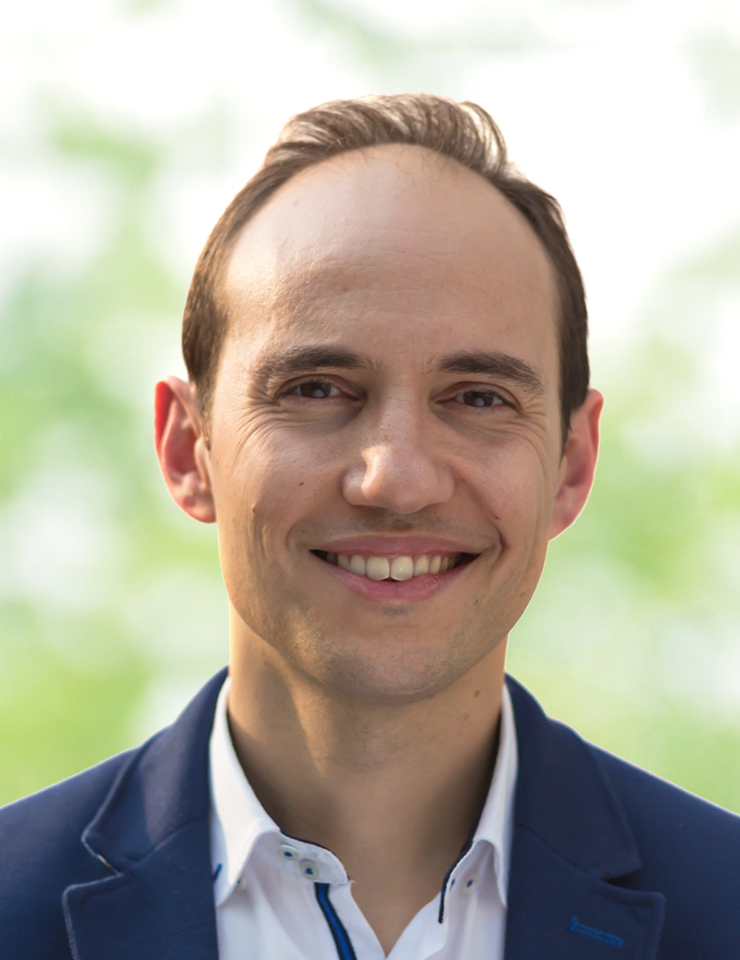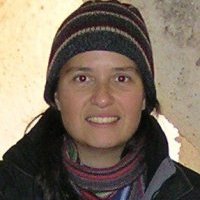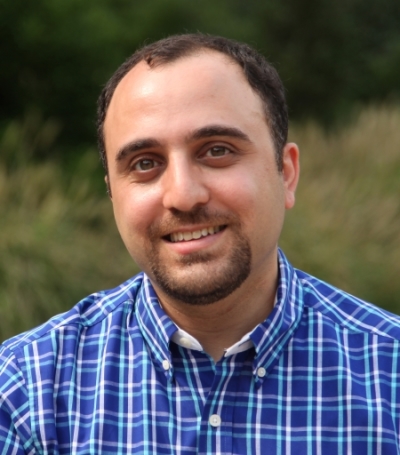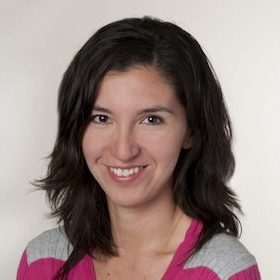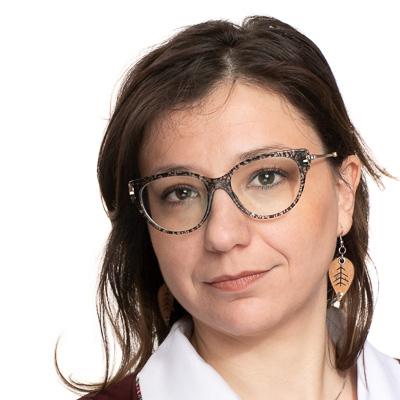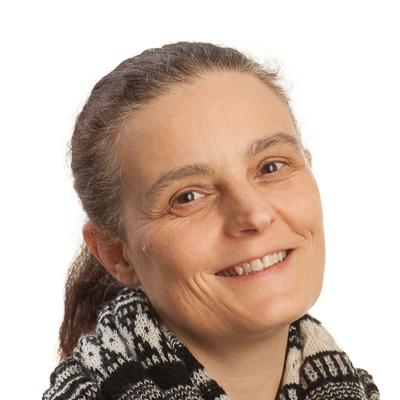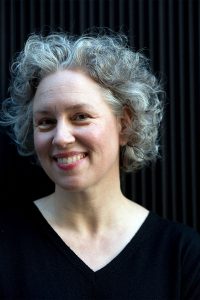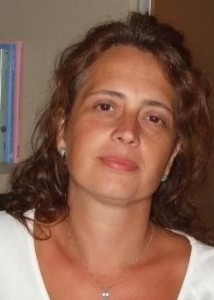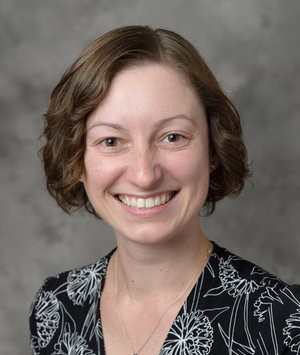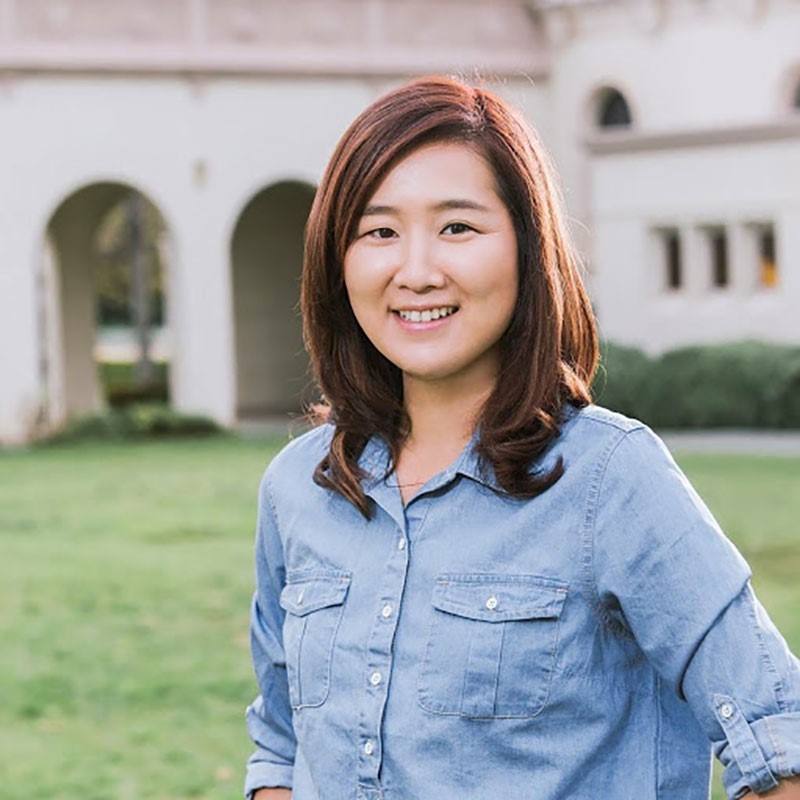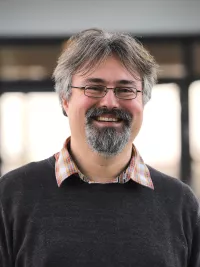Collection
ECSCW contributions
- Submission status
- Open
- Open for submission from
- 22 June 2022
- Submission deadline
- Ongoing
Editors
-
Charlotte Lee (2017)
Associate Professor in the Department of Human Centered Design & Engineering (HCDE) at the University of Washington and is the Director of the Computer Supported Collaboration (CSC) Laboratory. Lee’s research is in the field of Computer Supported Cooperative Work (CSCW) where she focus on the collaborative development of information infrastructures for diverse stakeholders.
-
Luigina Ciolfi (2017)
Professor (Human-Computer Interaction) in the School of Applied Psychology at University College Cork, Ireland. Human-computer interaction (HCI) and Computer-Supported Cooperative Work (CSCW) researcher and scholar, with interests in situated interaction, human experience of digital technology, interactive physical environments, cultural heritage, mobile and nomadic work and life practices, collaborative systems, and participation in design.
-
David Randall (2017)
Dave Randall is senior professor with the group Information Systems and New Media, University of Siegen. His interests are mainly to do with CSCW/HCI and the use of ethnographic methods for design purposes. Although formally retired, he continues to work actively with various members of the group, providing writing and other support. He is also visiting professor at Linnaeus University in Sweden.
-
Claudia-Lavinia Ignat (2018)
Research scientist at Inria Nancy-Grand Est and the vice-head of Coast team. Research interests are distributed collaborative systems with a focus on consistency maintenance, group awareness, security, trust issues and user studies.
-
Pernille Bjørn (2018)
Professor at Department of Computer Science - Human-centred Computing, University of Copenhagen. Research interest is to investigate the basic nature of collaborative work with the aim of designing collaborative technologies – thus main research area is Computer Supported Cooperative Work (CSCW).
-
Prasun Dewan (2018)
Professor at the Dept. of Computer Science of University of North Carolina Chapel Hill. Research falls in the areas of distributed systems, user-interface toolkits, object-oriented systems, operating systems and software engineering environments.
-
Chiara Rossitto (2019)
Chiara Rossitto, Associate Professor of Human-Computer Interaction, is a Senior Lecturer of HCI at Stockholm University, Sweden. She's a faculty member for the the Rich and Healthy Life working group at Digital Futures research centre. For the third consecutive year, she will serve as AC for the “Critical Computing, Sustainability, and Social Justice Subcommittee” at CHI.
-
Michael Muller (2019)
Michael Muller works as a Senior Research Scientist in the AI Interactions group of IBM Research AI, where his work focuses on the human aspects of data science; ethics and values in applications of AI to human issues; metrics and analytics for enterprise social software applications, with particular application to employee engagement emergent social phenomena in social software.
-
Antonella De Angeli (2020)
Professor at the Faculty of Computer Science, Free University of Bozen-Bolzano, Italy.Her research involves a Humanistic exploration of technology which brings the human to the forefront of design while grounding on the Renaissance emphasis on education as the key element for promoting civic participation and on participatory design as a way to promote democratic activism.
-
Thomas Ludwig (2020)
Thomas Ludwig is a professor for cyber-physical systems at the University of Siegen (Germany). His research focuses on the human-centered design of cyber-physical systems and AI as well as the impact of digitalization on work structures and practices. The application domains range from industrial contexts and the ICT support for workers at the machines to crisis management and the collaboration between emergency services and volunteers.
-
Fabiano Pinatti (2020)
Fabiano Pinatti, PhD is currently a Research Associate at the Institute of Information Systems and New Media of the University of Siegen, Deputy Director of the Chair for Computer Supported Cooperative Work and Social Media of the same university and the university Leader for the iDESkmu Project. He is a Professional Member of the European Society for Socially Embedded System (EUSSET) and the Association for Computing Machinery (ACM).
-
Michael Prilla (2021)
Professor Michael Prilla is head of the Department of Informatics - Human-Centred Information Systems at Clausthal University of Technology. His research puts emphasis on the integration of stakeholders into the development of IT technology and the mutual shaping of IT and human behavior. Deputy head of the German Computer Association ("Gesellschaft für Informatik") Special Interest Group for CSCW
-
Adriana Vivacqua (2021)
Professor in the Computer Science Department at the Federal University of Rio de Janeiro (UFRJ). Her research interests include intelligent human-computer interaction, personalization, and ambient and collective intelligence.
-
Christine Wolf (2021)
Senior Researcher at Thomson Reuters
-
Mohammad Jarrahi (2022)
I am an Associate Professor at the University of North Carolina at Chapel Hill. My research focuses on the use and consequences of information and communication technologies (ICTs) in extra-organizational contexts, and flexible work arrangements (e.g., mobile and gig work). I am also interested in the role of artificial intelligence (AI) in the future of work.
-
Claudia López (2022)
Department of Informatics, Universidad Técnica Federico Santa María, Valparaíso, Chile. I am an information science researcher. My research focuses on the design and empirical evaluation of social technologies, the study of new dynamics of information use and production, and their implications for civic participation.
-
Elena Parmiggiani (2022)
I am Associate Professor in CSCW and Digital Collaboration and Deputy Head of Department for Sustainability at the Department of Computer Science, NTNU. I belong to the Applied Information Technologies (AIT) group. I have coordinated the Digital Enterprise Research Priority Area at the Faculty of Information Technology and Electrical Engineering (2019-2022). I hold a PhD in Computer Science from NTNU (2015). My PhD thesis was titled: "Integration by Infrastructuring: The Case of Subsea Environmental Monitoring in Oil and Gas Offshore Operations". My primary research interest is the study of the empirical challenges of implementing and main
-
Monica Divitini (2023)
Monica Divitini is Professor in Cooperation Technologies at IDI-NTNU since 2002. She holds a PhD in Computer Science from Aalborg University, Denmark.
-
Ingrid Erickson (2023)
Assistant Professor at Syracuse University, School of Information Studies, USA. I am a scholar of work and technology, currently fascinated by the way that mobile devices and ubiquitous digital infrastructures are influencing how we communicate with one another, navigate and inhabit spaces, and engage in new types of sociotechnical practices. I consider myself to be at the nexus of three disciplinary communities: organizational studies, information science & human-centered computing, and science and technology studies. To this end, I regularly attend the Academy of Management, Computer Supported Cooperative Work (CSCW) and Society for the So
-
Chien Wen (Tina) Yuan (2023)
Associate Professor at Graduate Institute of Library & Information Studies, National Taiwan Normal University, Taiwan
-
Maristella Matera (2024)
Maristella Matera, Associate Professor at the Politecnico di Milano – Dipartimento di Elettronica, Informazione e Bioingegneria (DEIB), Milan, Italy, maristella.matera@polimi.it
-
Francisco J. Gutierrez (2024)
Francisco J. Gutierrez holds an Adjunct Professor position in HCI and Applied Software Engineering in the Department of Computer Science at the University of Chile in Santiago, Chile, frgutier@dcc.uchile.cl.
-
Gabriela Marcu (2024)
Gabriela Marcu, Assistant Professor at the School of Information, University of Michigan, USA, gmarcu@umich.edu.
-
Jina Huh-Yoo (2025)
Jina Huh-Yoo, PhD is an associate professor of human-computer interaction in the Department of Information Science at Drexel's College of Computing & Informatics (CCI), Philadelphia, PA, USA. Her research areas include human-computer interaction, health informatics, and research ethics. jina.huh@gmail.com
-
Alexander Boden (2025)
Prof. Dr Alexander Boden, Professor for business economics, esp. Software Engineering/Schwerpunktprofessor for economical and social sustainablity/Co-Director of the Institute for Digital Consumption (Consumer Informatics) at Hochschule Bonn-Rhein-Sieg, University of Applied Sciences, Germany, alexander.boden@h-brs.de
Articles (93 in this collection)
-
-
Everyday Diagnostic Work in the Histopathology Lab: CSCW Perspectives on the Utilization of Data-Driven Clinical Decision Support Systems
Authors (first, second and last of 4)
- Rob Procter
- Mark Rouncefield
- Clare Verrill
- Content type: ECSCW Contribution
- Open Access
- Published: 24 April 2024
-
Cultivating Data Practices Across Boundaries: How Organizations Become Data-driven
Authors
- Asbjørn Malte Pedersen
- Claus Bossen
- Content type: ECSCW contribution
- Open Access
- Published: 28 February 2024

-
Analysis of Coordination Mechanisms during Collaborative Problem-Solving on an Interactive Tabletop Display
Authors (first, second and last of 5)
- Valérie Maquil
- Hoorieh Afkari
- Patrick Sunnen
- Content type: ECSCW Contribution
- Open Access
- Published: 08 February 2024

-
The Generative Role of Objects in Infrastructure Design: A Case of Designing a System for Continuity of Care
Authors
- Christopher Sadorge
- Monika Nerland
- Miria Grisot
- Content type: ECSCW Contribution
- Open Access
- Published: 19 December 2023
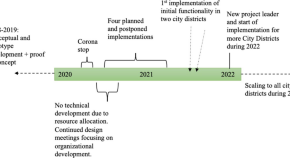
-
Text-based Patient – Doctor Discourse Online And Patients’ Experiences of Empathy
Authors (first, second and last of 7)
- Silja Martikainen
- Laura Kohonen-Aho
- Katri Saarikivi
- Content type: ECSCW Contribution
- Open Access
- Published: 19 October 2023
-
Using a Service Lens to Better Understand Practices –and Vice Versa
Authors
- Babak A. Farshchian
- Marius Mikalsen
- Content type: ECSCW Contribution
- Open Access
- Published: 19 August 2023
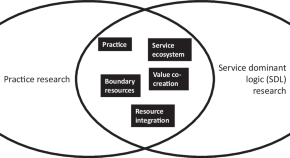
-
Learning from Other Communities: Organising Collective Action in a Grassroots Food-sharing Initiative
Authors
- Katie Berns
- Chiara Rossitto
- Jakob Tholander
- Content type: ECSCW Contribution
- Open Access
- Published: 14 August 2023
- Pages: 951 - 999
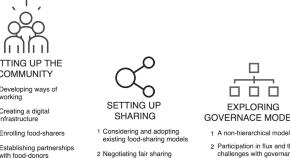
-
Who Cares About Data? Ambivalence, Translation, and Attentiveness in Asylum Casework
Authors
- Trine Rask Nielsen
- Maria Menendez-Blanco
- Naja Holten Møller
- Content type: ECSCW Contribution
- Open Access
- Published: 26 June 2023
- Pages: 861 - 910

-
Educational Participatory Design in the Crossroads of Histories and Practices – Aiming for Digital Transformation in Language Pedagogy
Authors (first, second and last of 4)
- Marianne Kinnula
- Netta Iivari
- Tonja Molin-Juustila
- Content type: ECSCW Contribution
- Open Access
- Published: 08 June 2023
- Pages: 745 - 780

-
The Human Infrastructure of Civic Data: A Taxonomy for Participatory Infrastructuring of Civic Data
Authors
- Firaz Peer
- Content type: ECSCW Contribution
- Published: 03 June 2023
- Pages: 825 - 859

-
Caseworkers’ participation in procurement: Infrastructuring Child Welfare Services in Norway
Authors
- Tangni C. Dahl-Jørgensen
- Elena Parmiggiani
- Content type: ECSCW Contribution
- Open Access
- Published: 17 May 2023
- Pages: 781 - 823

-
Fostering Research Data Management in Collaborative Research Contexts: Lessons learnt from an ‘Embedded’ Evaluation of ‘Data Story’
Authors (first, second and last of 6)
- Gaia Mosconi
- Aparecido Fabiano Pinatti de Carvalho
- Volkmar Pipek
- Content type: ECSCW Contribution
- Published: 15 May 2023
- Pages: 911 - 949

-
Revisiting the Digital Plumber: Modifying the Installation Process of an Established Commercial IoT Alarm System
Authors (first, second and last of 4)
- Teresa Castle-Green
- Stuart Reeves
- Boriana Koleva
- Content type: ECSCW Contribution
- Open Access
- Published: 04 March 2023
- Pages: 607 - 643

-
Green IT Meaning in Energy Monitoring Practices: The Case of Danish Households
Authors
- Nadine Sandjo Tchatchoua
- Nina Boulus-Rødje
- Val Mitchell
- Content type: ECSCW Contribution
- Published: 25 January 2023
- Pages: 675 - 712

-
Progressivity in Hybrid Meetings: Daily Scrum as an Enabling Constraint for a Multi-Locational Software Development Team
Authors
- Safinaz Buyukguzel
- Robb Mitchell
- Content type: ECSCW Contribution
- Published: 23 January 2023
- Pages: 573 - 606

-
Becoming a Guest: On Proximity and Distance in Mental Health Home Treatment
Authors (first, second and last of 4)
- Stefan Hochwarter
- Julian Schwarz
- Eric Monteiro
- Content type: ECSCW Contribution
- Open Access
- Published: 12 December 2022
- Pages: 645 - 674

-
How Live Streaming Changes Shopping Decisions in E-commerce: A Study of Live Streaming Commerce
Authors (first, second and last of 6)
- Ye Wang
- Zhicong Lu
- Roger Wattenhofer
- Content type: ECSCW Contribution
- Open Access
- Published: 06 September 2022
- Pages: 701 - 729

-
Between a Rock and a Hard Place: Negotiating Dependencies and Precarity in the On-Demand Economy
Authors
- Srihari Hulikal Muralidhar
- Claus Bossen
- Jacki O’Neill
- Content type: ECSCW Contribution
- Published: 25 July 2022
- Pages: 443 - 486
-
Humor and Stereotypes in Computing: An Equity-focused Approach to Institutional Accountability
Authors
- Valeria Borsotti
- Pernille Bjørn
- Content type: ECSCW Contribution
- Published: 19 July 2022
- Pages: 771 - 803
-
Understanding Nomadic Practices of Social Activist Networks Through the Lens of Infrastructuring: the Case of the European Social Forum
Authors (first, second and last of 7)
- Aparecido Fabiano Pinatti de Carvalho
- Saqib Saeed
- Volker Wulf
- Content type: ECSCW Contribution
- Open Access
- Published: 18 July 2022
- Pages: 731 - 769
-
The March of Chatbots into Recruitment: Recruiters’ Experiences, Expectations, and Design Opportunities
Authors (first, second and last of 4)
- Sami Koivunen
- Saara Ala-Luopa
- Arja Haapakorpi
- Content type: ECSCW Contribution
- Open Access
- Published: 09 June 2022
- Pages: 487 - 516

-
The Tension between National and Local Concerns in Preparing for Large-Scale Generic Systems in Healthcare
Authors
- Gunnar Ellingsen
- Morten Hertzum
- Line Melby
- Content type: ECSCW Contribution
- Open Access
- Published: 16 March 2022
- Pages: 411 - 441
-
Regional Differences in Information Privacy Concerns After the Facebook-Cambridge Analytica Data Scandal
Authors (first, second and last of 4)
- Felipe González-Pizarro
- Andrea Figueroa
- Cecilia Aragon
- Content type: ECSCW Contribution
- Published: 14 February 2022
- Pages: 33 - 77

-
Examining Co-Owners’ Privacy Consideration in Collaborative Photo Sharing
Authors
- Yao Li
- Xinning Gui
- Content type: ECSCW Contribution
- Published: 17 January 2022
- Pages: 79 - 109

-
Inverted Hierarchies on the Shop Floor: The Organisational Layer of Workarounds for Collaboration in the Metal Industry
Authors
- Frauke Mörike
- Content type: ECSCW Contribution
- Open Access
- Published: 02 December 2021
- Pages: 111 - 147

-
Understanding Matchmakers’ Experiences, Principles and Practices of Assembling Innovation Teams
Authors
- Sami Koivunen
- Ekaterina Olshannikova
- Thomas Olsson
- Content type: ECSCW Contribution
- Open Access
- Published: 12 November 2021
- Pages: 589 - 616

-
Tensions in Representing Behavioral Data in an Electronic Health Record
Authors
- Gabriela Marcu
- Anind K. Dey
- Sara Kiesler
- Content type: ECSCW Contribution
- Open Access
- Published: 22 June 2021
- Pages: 393 - 424

-
Context-based Automated Responses of Unavailability in Mobile Messaging
Authors
- Pranut Jain
- Rosta Farzan
- Adam J. Lee
- Content type: ECSCW Contribution
- Published: 25 May 2021
- Pages: 307 - 349

-
Immersive Cooperative Work Environments (CWE): Designing Human-Building Interaction in Virtual Reality
Authors (first, second and last of 4)
- Pernille Bjørn
- Mark Wulff
- Naja Holten Møller
- Content type: OriginalPaper
- Published: 16 March 2021
- Pages: 351 - 391

-
shARe-IT: Ad hoc Remote Troubleshooting through Augmented Reality
Authors (first, second and last of 4)
- Thomas Ludwig
- Oliver Stickel
- Malte Sellmer
- Content type: OriginalPaper
- Open Access
- Published: 23 February 2021
- Pages: 119 - 167

-
Brokerbot: A Cryptocurrency Chatbot in the Social-technical Gap of Trust
Authors
- Minha Lee
- Lily Frank
- Wijnand IJsselsteijn
- Content type: OriginalPaper
- Open Access
- Published: 14 April 2021
- Pages: 79 - 117

-
(Re)Configuring Hybrid Meetings: Moving from User-Centered Design to Meeting-Centered Design
Authors (first, second and last of 4)
- Banu Saatçi
- Kaya Akyüz
- Clemens Nylandsted Klokmose
- Content type: OriginalPaper
- Open Access
- Published: 19 November 2020
- Pages: 769 - 794

-
Streaming your Identity: Navigating the Presentation of Gender and Sexuality through Live Streaming
Authors
- Guo Freeman
- Donghee Yvette Wohn
- Content type: OriginalPaper
- Published: 23 September 2020
- Pages: 795 - 825
-
How Does Collaborative Reflection Unfold in Online Communities? An Analysis of Two Data Sets
Authors
- Michael Prilla
- Oliver Blunk
- Irene-Angelica Chounta
- Content type: OriginalPaper
- Open Access
- Published: 18 August 2020
- Pages: 697 - 741

-
Coding and Classifying Knowledge Exchange on Social Media: a Comparative Analysis of the #Twitterstorians and AskHistorians Communities
Authors (first, second and last of 4)
- Anatoliy Gruzd
- Priya Kumar
- Caroline Haythornthwaite
- Content type: OriginalPaper
- Open Access
- Published: 29 June 2020
- Pages: 629 - 656

-
When the System Does Not Fit: Coping Strategies of Employment Consultants
Authors (first, second and last of 5)
- Mateusz Dolata
- Birgit Schenk
- Gerhard Schwabe
- Content type: OriginalPaper
- Published: 09 June 2020
- Pages: 657 - 696

-
Unpacking the Role of Boundaries in Computer-Supported Collaborative Teaching
Authors
- Sara Willermark
- Lena Pareto
- Content type: OriginalPaper
- Open Access
- Published: 05 June 2020
- Pages: 743 - 767

-
Introduction to ECSCW 2019
Authors (first, second and last of 4)
- Chiara Rossitto
- Michael Muller
- Manfred Tscheligi
- Content type: EditorialNotes
- Published: 04 June 2019
- Pages: 291 - 292
-
Flexible Turtles and Elastic Octopi: Exploring Agile Practice in Knowledge Work
Authors (first, second and last of 4)
- Ingrid Erickson
- Deepti Menezes
- Thanushree Shetty
- Content type: OriginalPaper
- Open Access
- Published: 04 June 2019
- Pages: 627 - 653
-
Translation and Adoption: Exploring Vocabulary Work in Expert-Layperson Encounters
Authors
- Mateusz Dolata
- Gerhard Schwabe
- Content type: OriginalPaper
- Published: 04 June 2019
- Pages: 685 - 722

-
Scholars’ Perceptions of Relevance in Bibliography-Based People Recommender System
Authors (first, second and last of 4)
- Ekaterina Olshannikova
- Thomas Olsson
- Peng Yao
- Content type: OriginalPaper
- Open Access
- Published: 30 May 2019
- Pages: 357 - 389

-
Three Gaps in Opening Science
Authors (first, second and last of 8)
- Gaia Mosconi
- Qinyu Li
- Volkmar Pipek
- Content type: OriginalPaper
- Published: 29 May 2019
- Pages: 749 - 789

-
The Virtual Clinic: Two-sided Affordances in Consultation Practice
Authors (first, second and last of 6)
- Anna Sigridur Islind
- Ulrika Lundh Snis
- Gunnar Steineck
- Content type: OriginalPaper
- Open Access
- Published: 27 May 2019
- Pages: 435 - 468

-
Moral and Affective Differences in U.S. Immigration Policy Debate on Twitter
Authors (first, second and last of 4)
- Ted Grover
- Elvan Bayraktaroglu
- Eugenia Ha Rim Rho
- Content type: OriginalPaper
- Published: 26 May 2019
- Pages: 317 - 355

-
Online Harassment in the Workplace: the Role of Technology in Labour Law Disputes
Authors
- Nelson Tenório
- Pernille Bjørn
- Content type: OriginalPaper
- Published: 18 May 2019
- Pages: 293 - 315

-
Rethinking Financial Inclusion: from Access to Autonomy
Authors
- Srihari Hulikal Muralidhar
- Claus Bossen
- Jacki O’Neill
- Content type: OriginalPaper
- Published: 15 May 2019
- Pages: 511 - 547
-
Co-Creating Platform Governance Models Using Boundary Resources: a Case Study from Dementia Care Services
Authors
- Babak A. Farshchian
- Hanne Ekran Thomassen
- Content type: OriginalPaper
- Published: 15 May 2019
- Pages: 549 - 589

-
Cyber-Physical Systems for Knowledge and Expertise Sharing in Manufacturing Contexts: Towards a Model Enabling Design
Authors (first, second and last of 6)
- Sven Hoffmann
- Aparecido Fabiano Pinatti de Carvalho
- Volker Wulf
- Content type: OriginalPaper
- Published: 10 May 2019
- Pages: 469 - 509

-
Territorial Functioning in Collaborative Writing
Authors
- Ida Larsen-Ledet
- Henrik Korsgaard
- Content type: OriginalPaper
- Published: 08 May 2019
- Pages: 391 - 433




